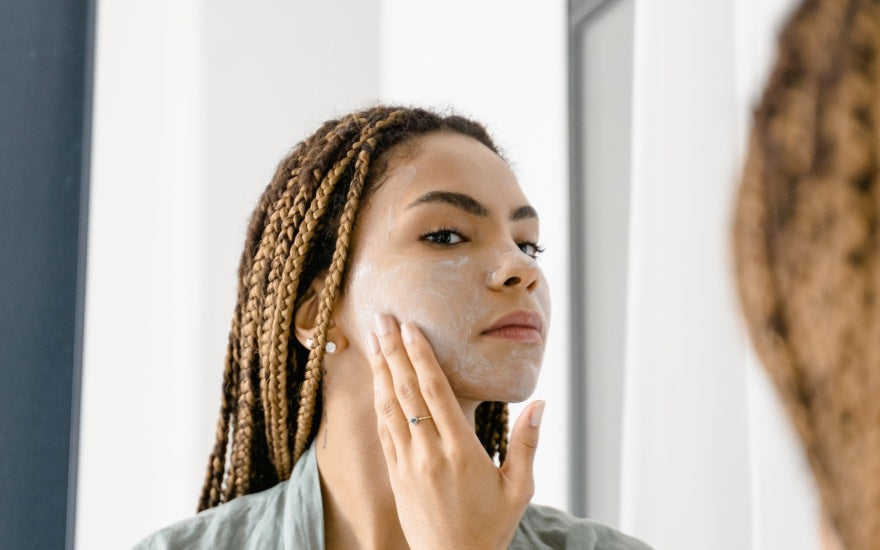Here's how to effectively nourish your skin
Do you know how to moisturize your skin ? But above all, do you know why you need to moisturize your skin?
Facial skin hydration is one of the most essential steps in your skin care routine .
Why is it so important to moisturize the skin?
The skin has a stratum corneum, made up of various components such as fatty acids and ceramides, which protects it from irritants and inflammation and also helps keep its deeper layers hydrated.
Therefore, using moisturizers containing those ingredients can guarantee greater effectiveness and make the skin healthier.
Hydration is a step that should not be missing in any skin type. There are those who think that oily skin doesn't need it and therefore tend to use products that dry the skin, but are aggressive substances that ultimately stimulate the production of sebum.
Remember to apply moisturizers while the skin is still damp. Pat it dry with a towel so that some moisture remains. Then apply moisturizer to help trap water in the skin.
Did you know that snail slime cosmetics are perfect for hydrating the skin? Click here to find out more!
The cosmetic ingredients that can moisturize the skin
The main concept to keep in mind on how to moisturize the skin is to know the ingredients that more than others contribute to hydrating it.
What are the best substances for skin hydration?
They are ingredients that moisturize the top layer of skin cells and seal in water. They contain 2 main types of substances:
- Humectants : Help attract moisture and include ceramides, glycerin, sorbitol, hyaluronic acid, and lecithin.
- Emollients : These contain oil, water, and an emulsifier to keep them from separating. Many commercial moisturizers contain both an emollient and a humectant, such as linoleic and lauric acids.
In general, the thicker and oilier a product is, the more effectively it hydrates the skin.

The patch test before using a new moisturizer
You may have heard of patch testing. This is usually mentioned when it comes to shopping for makeup products, but you should do the same for skin care products.
Why do a patch test before using a moisturizer?
You might not like the smell of it, for example. But above all, the test will be useful for checking if your skin will react to that cosmetic, as well as to topical soaps or medicines. A product could cause clogged pores, allergic reactions, or skin rashes.
Allergic reactions to some cosmetics can cause everything from mild redness to painful swelling.
With skincare products, instead of testing the product on the back of your hand, you should apply a small amount to your inner arm, where the skin is thinnest, then wait a day or two to see if there are any reactions.
To find out if a new product is clogging your pores, apply it to a small area along your jawline to see if new pimples will form, before applying it all over your face.
You also need to check the label on your moisturizer – like any other cosmetic you decide to buy – because a product may contain potentially irritating ingredients.
Use a moisturizer suitable for your skin type
Finding out your skin type helps you find the most suitable, least irritating and most effective cosmetics.
- Normal skin : it is neither too dry nor too oily. You must therefore maintain this natural water balance, using a water-based moisturizer and light oils.
- Dry skin : tends to feel itchy or rough. You may want a moisturizer that contains ingredients that help retain water, such as hyaluronic acid, which is a powerful humectant, along with ceramides.
- Oily or acne-prone skin: You'll need to look for products that are non-comedogenic (won't clog pores) or "oil-free" on the label. It's shiny skin and prone to acne and breakouts, but it still needs moisture, especially after using skincare products that strip away oils and dry out the skin.
- Combination skin : has dry and oily areas. We talk about the famous T-zone, with the forehead, nose and chin as oily areas and dry cheeks. Use a light moisturizer on your face and a heavier one on your arms and legs.
- Sensitive skin : it is prone to irritation, redness, itching or rashes. Look for a moisturizer with soothing ingredients, like chamomile or aloe, gentle products like hypoallergenic, fragrance-free, and for sensitive skin. Also be aware that cosmetics labeled as unscented can still irritate the skin, as they may contain masking fragrances. Also avoid products containing acids, which can irritate sensitive skin.
- Mature Skin : As we age, skin tends to become thinner, drier, less elastic, and less able to protect itself from environmental damage. To keep your skin soft and well-hydrated, choose an oil-based moisturizer that contains petroleum jelly, which helps lock in moisture. Hydration can make wrinkles less visible.
Ideal ingredients to moisturize the skin
Here are some natural ingredients that you can use to hydrate your skin (and, therefore, to look for in cosmetic products):
- Olive Oil : Natural oils generally play an important role in keeping the skin hydrated. The antioxidants found in olive oil help soothe the skin and repair cells damaged by excessive dryness. It can also help prevent age-related fine lines.
- Almond oil : It is an excellent source of vitamin E.
- Coconut Oil : This is another type of oil that can work for dry skin during winter.
- Honey : This is a great moisturizer to apply to dry skin.
- Aloe vera : has thick leaves that store a gel-like substance known to be an excellent moisturizer in winter.
- Snail slime : it is rich in proteins, allantoin and mucopolysaccharides, excellent active ingredients for keeping the skin hydrated and nourished.
- Shea butter: emollient and moisturizing, also ideal against wrinkles.
